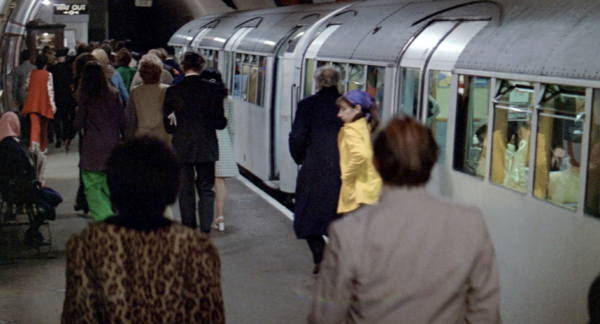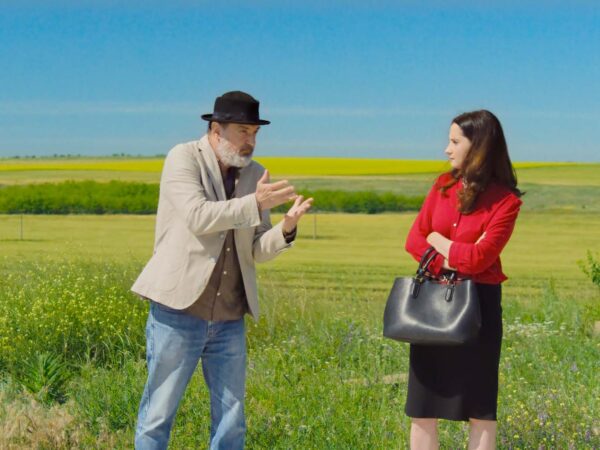Listed: Top 3 of 2024
50+ Programmers, Filmmakers and Critics Pick This Year’s Most Remarkable Short Films
In a yearly tradition, Talking Shorts invites filmmakers, critics, and programmers to pick their three favourite short films of the year.
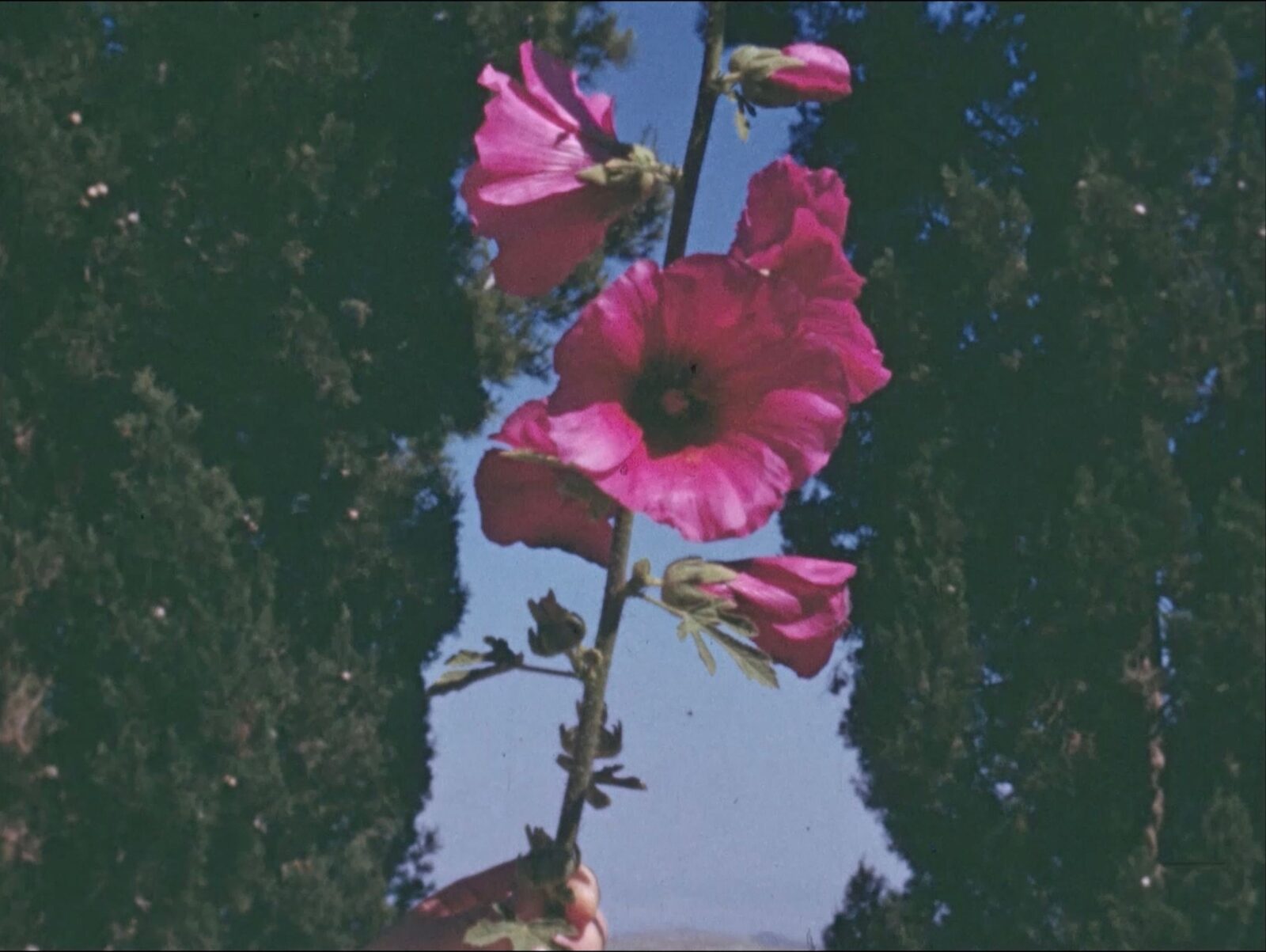
Continuing our tradition, this long read is an opportunity to celebrate the art of short films as it gives those in the short film community a chance to ruminate on the films that resonated with them the most in the past year. No list is ever complete, and every list is arbitrary, yet this remarkable collection of shorts shines a light on the diversity of the short film format and why it remains a beacon of hope and inspiration for those affectionate with cinema.
Each list remains the choice of the individuals who responded, and it (and the motivations therein) do not necessarily reflect that of the organisation(s) they work for. We want to express our gratitude to everybody who participated.
Enjoy reading and discovering!
Ayman Alazaraq, programmer Gaza Film Unit
Norway
— UNDR by Kamal Aljafari (Palestine – 2024, 15’): Through helicopter footage, the film surveys deserts, ancient formations, and human interventions, while archival material weaves an eerie narrative of calculated incursion—evoking Palestine’s enduring reality as a land under aerial surveillance and appropriation.
— An Orange from Jaffa by Mohammed Almughanni (Palestine, Poland, France – 2024, 27’): This film captures the silent violence and daily oppression experienced by Palestinians.
— The Flowers Stand Silently, Witnessing by Theo Panagopoulos (Scotland – 2024, 17’): This film uses archival footage to shed light on hidden colonial power dynamics, celebrates the often-overlooked stories of Arab Palestinians, and encourages us to rethink our understanding of history.
Jonathan Ali, Director of Programming Third Horizon Film Festival
United Kingdom
— History Is Written at Night by Alejandro Alonso Estrella (Cuba – 2024, 20’): Departing from a whispered conversation between the filmmaker and his mother in the near-darkness occasioned by the recent blackouts in Cuba, this is poetic meditation—formally audacious, masterfully executed—on the contemporary reality of the beleaguered island nation and its equally beleaguered people. If one little light can outshine the deepest night, then this quietly stunning film dares to imagine, if only for the briefest of moments, what a million such lights together can do.
— Under the Sky of Fetishes by Caroline Déodat (France, Mauritius – 2023, 16’): The poetics of cinema as a radical, decolonial practice are made breathtakingly manifest in this unforgettable interrogation of the Mauritian sega, a folk artform born out of fugitive anti-slavery resistance and trotted out today at the island’s hotels as a tourist diversion. A searching, poignant, transcendent film.
— A Night We Held Between by Noor Abed (Palestine – 2024, 30’): Noor Abed’s transfixing performance-led analogue films feel not like fictive constructions of cinema, but rather timeless documents—of the past, the present, and a future to come, all at once. A Night We Held Between continues the artist’s appropriation of classical myth—in this case, King Minos’ labyrinth—to create a haunting and unforgettable testament to the boundless and regenerative resistance of the Palestinian people.
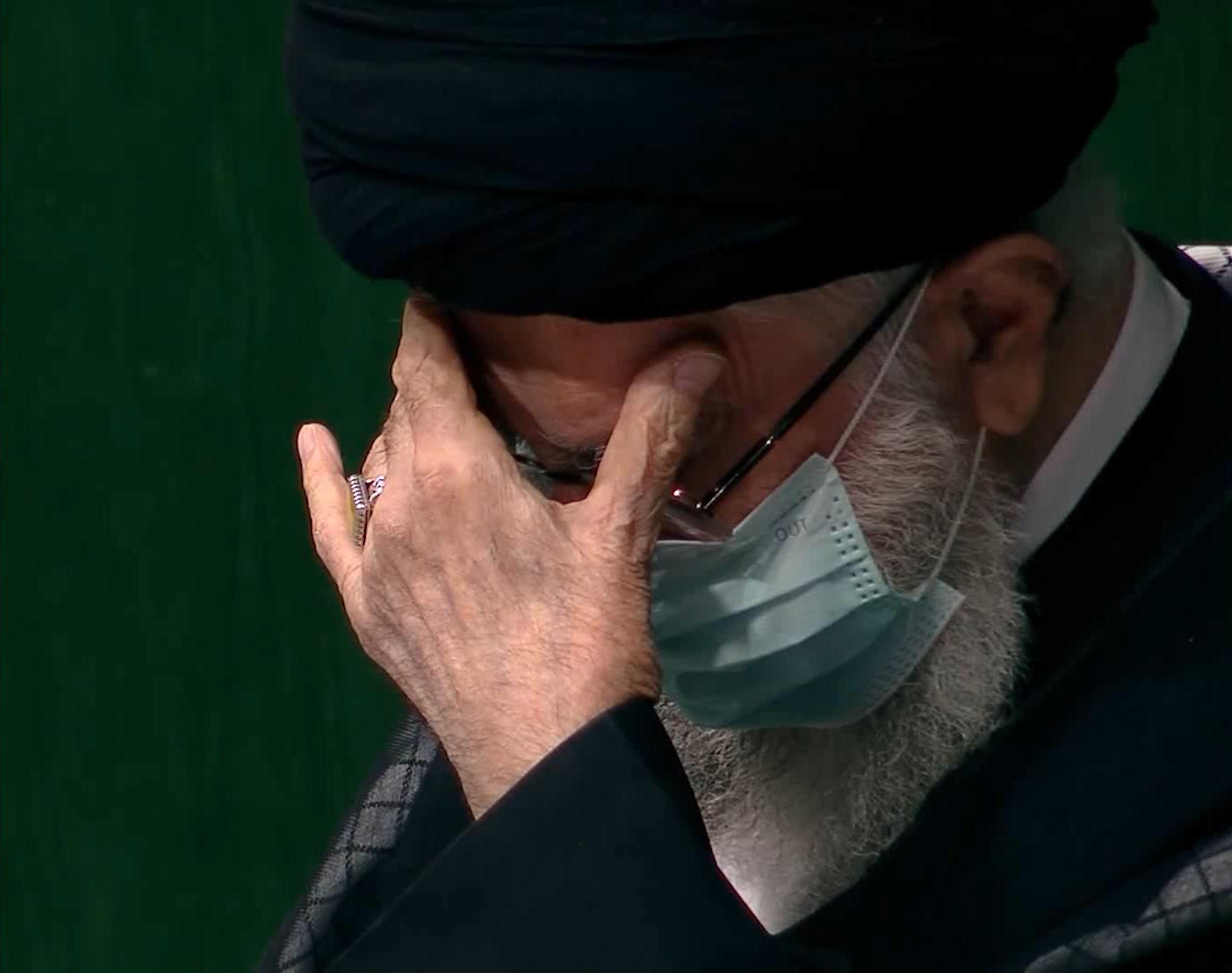
And How Miserable Is The Home Of Evil (Saleh Kashefi, 2023)
Jason Anderson, programmer Toronto International Film Festival (TIFF) & Aspen Shortsfest
Canada
— Vox Humana by Don Josephus Raphael Eblahan (Philippines, USA, Singapore – 2024, 22’): No other short could match it for me in terms of its scope, vision, mystery, command, and sheer gorgeousness.
— Are You Scared To Be Yourself Because You Think That You Might Fail? by Bec Pecaut (Canada – 2024, 17’): A favourite from the Canadian batch that is deservedly getting some international circulation, remarkable for its frankness, complexity, and generosity of spirit.
— Grandmamauntsistercat by Zuza Banasińska (The Netherlands, Poland – 2024, 23’): Impressive not only for its degree of cunning and craft but for a sense of wit that couldn’t be any sharper.
Simone Bardoni, Festival Director Concorto Film Festival
Italy
— 2720 by Basil da Cunha (Portugal, Switzerland – 2023, 24’): A long take that takes us on an astonishing journey inside a place and its inhabitants.
— On The Way (Rrugës) by Samir Karahoda (Kosovo – 2024, 15’): A country, a father and a son, and a road trip. Different states of mind between hope and uncertainty. And Jonathan Bree’s song “In The Sunshine” is one you won’t forget.
— City of Poets by Sara Rajaei (The Netherlands – 2024, 21’): Telling the story of Iran and its cultural and social heritage. Between utopia and memory, allegory and testimony, through archive material that mixes with the present’s desires when certain things cannot be archived. Enlightening.
Călin Boto, film curator & programmer Bucharest International Experimental Film Festival & Woche der Kritik
Romania
— Ludwig (Power Inferno) by Anton Bialas (France – 2024, 15’): One of the most underrated shorts of the year, Bialas’ film is indeed unusual. A rendition of Luchino Visconti’s eponymous classic in the times of Albert Serra’s The Death of Louis XIV, Ludwig is such an intense meditation on sexuality, power, and excess that it soon becomes a one-person erotic role-play, a perfect circle going round and round. It’s a film of great camp sensibility, with spectacular glances at “luxury”, “gold”, “castles”, “pleasure”, and war.
— What We Ask of a Statue Is That It Doesn’t Move (Afto pou zitame apo ena agalma ine na min kinite) by Daphné Hérétakis (Greece, France – 2024, 31’): Quirky and sensitive fictitious nonfiction, this is one of the best contemporary films about a very contemporary state of mind—overwhelmed by history, going in and out of the abyss of the present.
— The Mars Project (Le Projet Mars) by Louis Rémy (France – 2023, 12’): Can you explain this gap in your resume? Through a simple montage of the archive of video applications for Mars One—a sensational scam from the early 2010s that promised people the chance of becoming the first colonizers of Mars—The Mars Project becomes a fascinating spectacle of the protocols through which people sell their time, narrative and image.
John Canciani, Artistic Director Internationale Kurzfilmtage Winterthur
Switzerland
— Genealogy of Violence by Mohamed Bourouissa (France – 2024, 15’): This film powerfully illustrates how everyday racism operates and the profound impact it has on those affected. A gradual erosion and sense of hopelessness emerge, eventually becoming the status quo of these characters’ mental states. The film is not only highly relevant but also comes to life as a compelling experience in the cinema—something that could never have the same impact on a smaller screen.
— 2006 by Gabriella Choueifaty (Lebanon/France – 2024, 24’): The film tells a story from the civilians’ point of view and how they cope with everyday life, the daily madness and waiting in a crisis area. The film shows that the conflict in the Middle East is a cycle of violence and no matter what you think politically, the life of civilians must always be protected, no matter what the circumstances. This is non-negotiable and the suffering of civilians must be at the top of our politicians’ agenda. The great acting of the protagonists makes the film all the more powerful.
— The Exploding Girl by Caroline Poggi & Jonathan Vinel (France – 2024, 19’): Poggi/Vinel always manage to surprise me. Their handwriting is unmistakable without being repetitive, but new aesthetic paths fit organically into their kind of narrative. The Exploding Girl joins their considerable oeuvre and like some of their other films, it will be a classic in short film history.
Eneos Çarka, filmmaker
USA
— Workers’ Wings (Krahët e Punëtorëve) by Ilir Hasanaj (Kosovo – 2024, 19’): An elegant reminder that the personal is always political and vice versa. The documentary’s lyricism shines through its heartfelt portrayal of the working class not as only a social group but made of individuals with dreams often shattered by the forces of capitalism.
— Ever Since, I Have Been Flying (O gün bu gündür, uçuyorum) by Aylin Gökmen (Switzerland – 2023, 19’): Haunting and yet romantic; perhaps every romance is soul-crushing in some ways. The film beautifully captures a Kurdish man’s memories with profound dignity and respect, while its evocative 16mm landscapes add a mesmerising, emotional depth to cultural memory and its forceful erasure by oppressive powers.
— Dancing in The Corner (Taniec w Narożniku) by Jan Bujnowski (Poland – 2024, 14’): Both nostalgic and introspective, Dancing in The Corner reflects on childhood dreams and cherished memories that the filmmaker holds so dearly, he wishes they could remain untouched. The result is a touching, warm, and evocative journey through the past.
Gabrielė Cegialytė, Managing Director Vilnius Short Film Festival
Lithuania
— Carrotica by Daniel Sterlin-Altman (Germany – 2024, 13’): I had noticed this film on the festival circuit for quite a while and was so excited to watch it finally. And it certainly did not disappoint! This funny, quirky, and sensitive film has everything it takes to win my heart—masterfully crafted animation, spicy topics, sharp humour, and an underlying message of acceptance and love.
— The One Who Knows by Eglė Davidavičė (Lithuania, France – 2024, 12’): Another animated coming-of-age story, this time from Lithuanian director Eglė Davidavičė. It is a touching story of young teens’ liberation from societal beauty standards and the journey toward self-acceptance. I applaud the talented director for their sensitive approach and openness in addressing these important themes through her beautiful animation.
— The Oasis I Deserve by Inès Sieulle (France – 2024, 22’): I conclude my list of favourites for the year with my most recent discovery—an innovative exploration of relationships, love, and control through human interactions with a chatbot. Throughout 2024, AI has been a constant topic of conversation, and this experimental piece captivated me entirely. I found myself unable to look away from the unsettling, AI-generated visuals and the disturbingly intimate dialogues between humans and AI chatbots. The game-like world it creates offers a new reality where individuals believe they can indulge their darkest fantasies without consequences—though that perception may be more illusory than they realise.
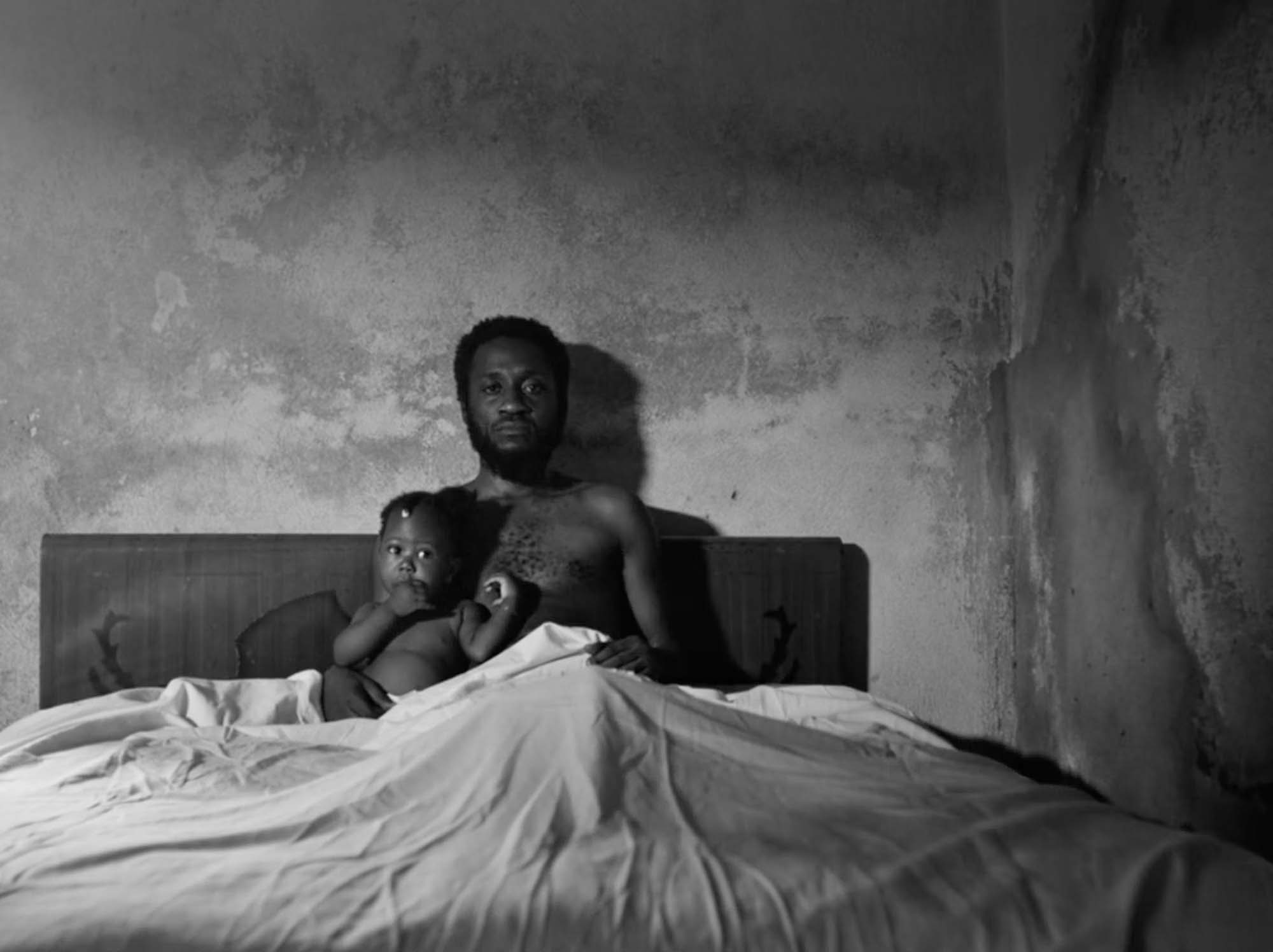
Dreams Like Paper Boats (Samuel Suffren, 2024)
Peter Cerovšek, Festival Director FeKK Ljubljana Short Film Festival
Slovenia
— Pain (Bol) by Ivan Faktor (Croatia – 2024, 22’): Pain is one of the most direct films on human creativity in the twilight of life. It is a cinematic defiance against suffering and the long dark night.
— The Oasis I Deserve by Inès Sieulle (France – 2024, 22’): A film that holds up a mirror to society, revealing who we become when entrusted with unlimited power.
— Man Number 4 by Miranda Pennell (UK – 2024, 10’): One single image challenges the portrayal of violence, yet it is far more precise than all the usual media representations.
Elena Chirila, filmmaker
Romania
— Worn Bodies (Corps tannés) by Malou Six (France – 2024, 19’): The entire film feels like a warm summer night—a fleeting moment suspended in time. It is raw, poignant, and beautiful, weaving together the delicate threads of pain and emotion with the resilience of the queer community at its core. This powerful work celebrates vulnerability and collectivity, showing how fight —metaphorically or literally—can serve as a path to belonging and a means of reclaiming identity and power.
— Honeymoon by Alkis Papastathopoulos (Greece – 2023, 25’): A touching story that keeps you hooked from start to finish. Films like this are crucial, offering accurate queer representation while shedding light on the life-altering struggles compounded by systemic oppression and police brutality. Beyond its powerful social commentary, the film remains deeply emotional, delving into the inner turmoil of Fay and Sandra with sensitivity and nuance. Beautifully shot and profoundly moving, this is a must-watch.
— The Man Who Could Not Remain Silent (Čovjek koji nije mogao šutjeti) by Nebojša Slijepčević (Croatia, France, Bulgaria, Slovenia – 2024, 13’): It’s hard to think of another film that uses silence and suspense so effectively. The waiting pierces you to the bone. “What’s going to happen?” “Where did the man go?” Suddenly, you’re no longer sitting on the grass at the outdoor cinema—you’re on that train in 1993, staying silent, even as every fiber of your being would want to act against the injustice.
Rimante Daugelaite, Head of Vilnius Short Film Festival & Lithuanian Shorts
Lithuania
— On The Way (Rrugës) by Samir Karahoda (Kosovo – 2024, 15’): The film explores social and political realities in such a subtle way, making it relatable far beyond Kosovo. It deserves recognition for how it masterfully captures the absurd and creates such convincing and natural conversations. It’s a brilliant mix of thoughtful storytelling and authenticity, which is a signature of all of Samir’s works.
— Dreams Like Paper Boats (Des rêves en bateaux papiers) by Samuel Suffren (Haiti – 2024, 19’): This is the discovery of this year. From the first minute, the feeling of longing and unconditional hope is not lost. The film’s rhythm and poetic images intertwined with the dreams take you to the sensitive household of a father and daughter and reveal the brutal political reality.
— The One Who Knows by Eglė Davidavičė (Lithuania, France – 2024, 12’): It is a deeply sensitive and feminine story about acceptance, bringing into a world of reality and (mythological) dreams. The director’s original animation style, combined with the personal nature of the story, adds a layer of authenticity both visually and in terms of storytelling.
Miguel Dias, Festival Director Curtas Vila do Conde – International Film Festival
Portugal
— Southern Brides (Las novias del sur) by Elena Lopez Riera (Spain, Switzerland – 2024, 39’)
— An Urban Allegory by JR & Alice Rohrwacher (France – 2024, 21’)
— It’s Not Me (C’est pas moi) by Leos Carax (France – 2024, 42’)
Hugo Emmerzael, film critic & editor Filmkrant
The Netherlands
— Scénarios by Jean-Luc Godard (France, Japan – 2024, 18’): The king is gone but not forgotten.
— I died in Irpin (Я померла в Ірпені) by Anastasia Falileieva (Ukraine, Czech Republic, Slovakia – 2024, 11’): Painfully beautiful animation doc about a burning land and torched heart.
— Home (Armat) by Anna Mkrtumyan (Armenia, Portugal, Belgium, Hungary – 2023, 14’): Notes on displacement and belonging, captured through lost archives and natural wonders.
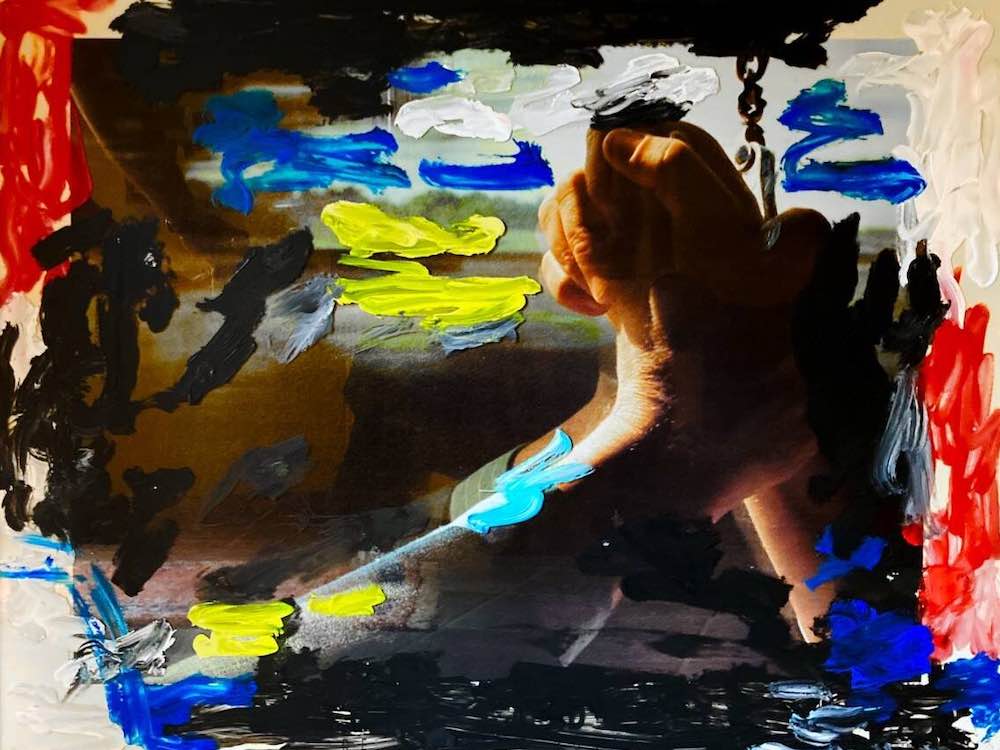
Scénarios (Jean-Luc Godard, 2024)
Florian Fernandez, Head of SFC | Rendez-vous Industry, Associate Programmer SXSW Doc Shorts, pre-selection committee member Festival du Nouveau Cinéma Montréal
France
— The Oasis I Deserve by Inès Sieulle (France – 2024, 22’): The most coherent and accomplished work exploring our relationship to the machine through a particularly honest, smart and deep artistic approach. Thanks to very thoughtful intentions and documentary archives collected on the web masterfully combined, the filmmaker gives life to the AI. The film offers not only a panorama of the possibilities explored by human users but provides a sensitive and subjective point of view as we access—through the image—the mind, the soul, and the most existential considerations of the so-called robot constantly transforming itself as it interacts with its user. At a key moment of great trouble surrounding us daily, the film also explores human nature in general and our connection with otherness.
— We Beg To Differ by Ruairi Bradley (Ireland – 2024, 13’): Through smooth and pure cinematography, the film achieves a deep dive into the underground world of a community. It explores not only a simple hobby but a true medium of expression. Cars, spinning and drifting (or more precisely “diffing”), become a language of their own, a way to feel freedom—physically and mentally—and an opportunity to bond lost souls together again.
— Panadrilo by Marcela Heilbron (Panama – 2023, 15’): Filled with a mystical daydreaming yet hectic atmosphere and supported by a distinctive cinematographic approach from the image to the sound, the filmmaker explores the inner feelings of a family with a quirky eye. At first challenging for the viewer, stakes are slowly unveiled and poetry intertwines with heavier social considerations. The final result leads to an uncanny journey through the complexities of immigration and sacrifice. It is the kind of film that calls for a re-watch, where everyone will witness something different.
Per Fikse, Festival Director Minimalen Short Film Festival
Norway
— O by Rúnar Rúnarsson (Iceland, Sweden – 2024, 29’): Poetic and visually striking, Rúnarsson makes use of minimal dialogue in this prime example of storytelling utilising the genuinely cinematic palette.
— On The Way (Rrugës) by Samir Karahoda (Kosovo – 2024, 15’): In a restrained narrative style, the film cleverly explores themes like migration and cultural identity, giving us a glimpse of the Kosovian state of mind.
— She Stays (Ella se queda) by Marinthia Gutiérrez (Mexico – 2024, 10’): In a style reminiscent of the French Nouvelle Vague, the atmospheric cinematography and subjective editing style skillfully paint a picture of urban alienation and solitude among friends, as the protagonist has to make a life-changing choice.
Niv Fux, curator and Festival Director Leiden Shorts
The Netherlands
— Mast-del (مست دل) by Maryam Tafakory (Iran, UK – 2023, 17’): Even after several views, like a dark old spell, the mysterious magnitude of Mast-del does not fade. It is a gut-wrenching portrayal of the unrepresentable—a tale of desires and dreams wanting to emerge beneath the dark realm (the boot) of the forbidden and oppressed. A true triumph of short cinema.
— for here am I sitting in a tin can far above the world by Gala Hérnandez (France – 2024, 19’): The grave fear of what the future holds permeates this dystopian short about crypto culture and speculative technologies and economies. Despite the inherent coldness of such worlds and the blend of graphs, figures, and YouTube finance videos, the film comes together as an incredibly rich, creative, and deeply humane work.
— 31°42’49.5″N 35°10’13.9″E by Francisca Khamis Giacoman (The Netherlands – 2023, 11’): How do memories from places never visited take shape? What lies in the gap between lost and reimagined memories? The (im)possibility of tracing back, of regaining significance and liberty, of undoing injustice, erasure, and dispossession, is reborn here. Through video and 3D imagery, the film builds a narrative of resistance through remembrance, a reimagined world unbounded by oppression.
Patrick Gamble, writer
United Kingdom
— Being John Smith by John Smith (UK – 2024, 27’): “It’s hard to have much enthusiasm for making art when you know the human race will soon be extinct.” A deeply political piece of autobiographical filmmaking, Smith’s characteristically dry exploration of his unassuming name transforms into a fascinating study of mortality and artistic legacy.
— Sinking Feeling by Zachary Epcar (USA – 2024, 21’): “How long will we keep debasing ourselves until they are satisfied?” A hypnagogic portrait of the post-pandemic workspace, in which employees are trapped between the fading promises of the past and the pervasive emptiness of the present.
— Like a Sick Yellow (Si e verdhë e sëmurë) by Norika Sefa (Kosovo – 2024, 23’): “She was so happy that they married her here, in this house.” Told with a haunted, middle-distance stare, Sefa’s film is an unnerving meditation on memory and trauma that combines the vague familiarity of home movies and the gradual disintegration of VHS tapes with the anxiety of the period just before the Kosovar war.
Anne Gaschütz, Festival Director FILMFEST DRESDEN – International Short Film Festival, selection committee member Locarno Film Festival’s Pardi di domani
Germany
— Dreams Like Paper Boats (Des rêves en bateaux papiers) by Samuel Suffren (Haiti – 2024, 19’): Beautifully shot and told, capturing a profound sense of longing, bleakness, and loneliness, this film poignantly portrays the fragile complexities of masculinity in a time of significant social and political upheaval. Set against the backdrop of a nation unraveling, its compelling narrative offers a hauntingly beautiful exploration of human vulnerability and kindness in the face of chaos.
— Que Te Vaya Bonito, Rico (May it Go Beautifully for You, Rico) by Joel Alfonso Vargas (UK, USA – 2024, 34’): A tender coming-of-age tale rooted in authenticity, that radiates an unexpected warmth and love. Undoubtedly influenced by the director’s own upbringing in the Bronx, the film offers a refreshing departure from more stereotypical narratives. Its teenage protagonists are young, flawed, and navigating poverty, yet their humanity shines through as they make mistakes and grow—a gentle and honest love story.
— Upshot by Maha Haj (Palestine, France, Italy – 2024, 34’): What begins as a depiction of a couple’s quiet existence in the countryside evolves into a deeply political and emotional narrative, exploring themes of trauma, resilience, and the fragile pursuit of normalcy in extraordinary circumstances. Its relevance transcends time, serving as an exploration of not only the past but, most importantly, the present and future. A powerful meditation on the human condition, it stands as an evocative reminder of the devastating impact of war on the most intimate aspects of life.
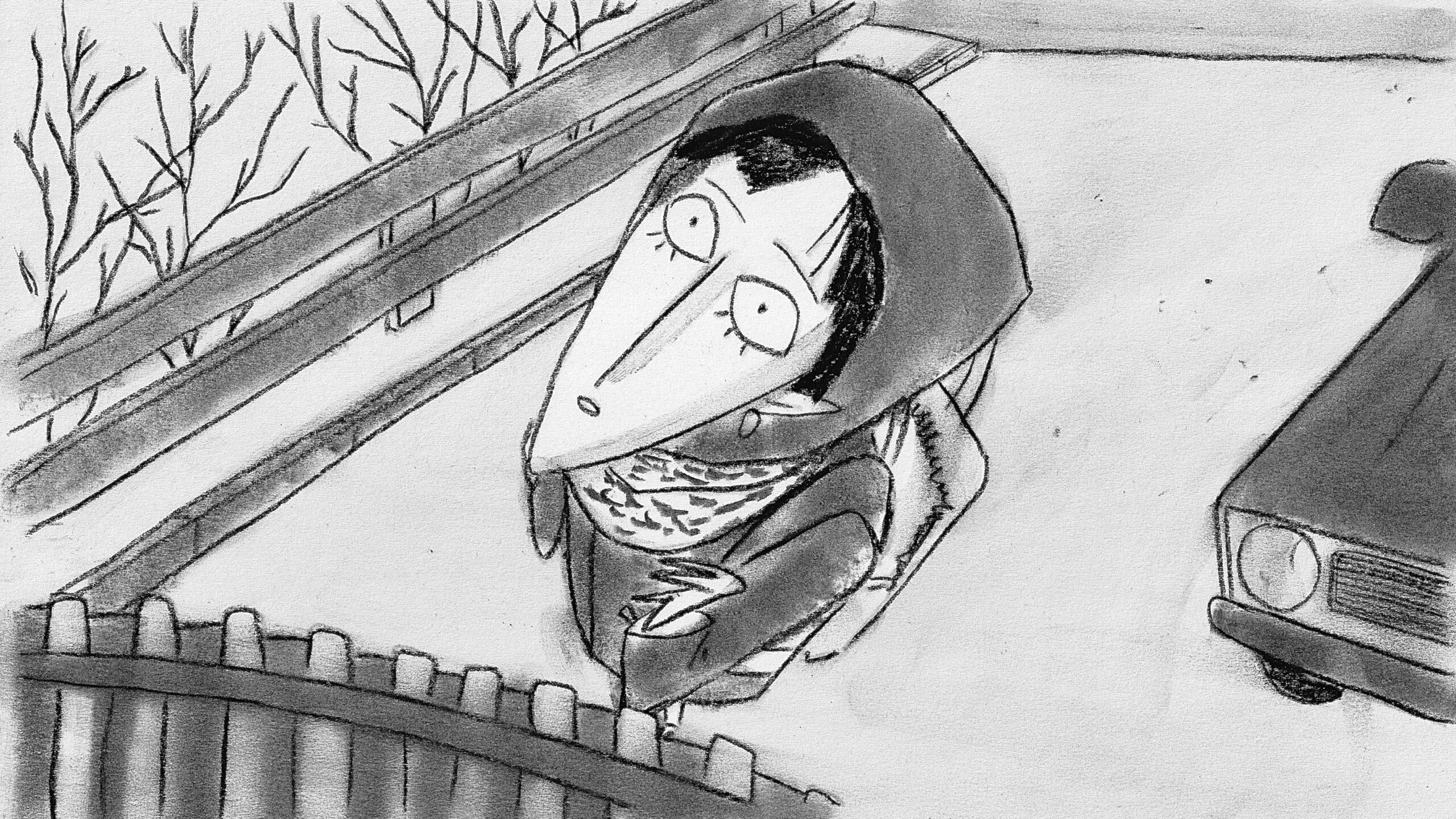
I Died in Irpin (Anastasia Falileieva, 2024)
Oana Ghera, Artistic Director Bucharest International Experimental Film Festival
Romania
— Crushed by Camille Vigny (Belgium – 2024, 13’): A powerful and moving recollection of the aftermath of an abusive relationship that questions the inner workings of romantic imagination through a surprising association of images and memories where the battered bodies of the cars become a metaphorical embodiment of the narrator’s own body (and soul).
— The Moving Garden (O Jardim em Movimiento) by Ines Lima (Portugal – 2024, 18’): A charming play on the fall from Eden, true to the fanciful spirit of Portuguese cinema, The Moving Garden is an enchanting cinematic fable on the encroaching commodification of nature.
— The Oasis I Deserve by Inès Sieulle (France – 2024, 22’): A spin on the proverbial black mirror of our pop culture’s imagination, The Oasis I Deserve offers a fascinating, albeit nightmarish, account of the interactions between humans and AI entities, while raising relevant questions about our relationship with the unknown, and confronting us with the reflection of our own cultural and moral biases.
Leandro Goddinho, filmmaker and lecturer
Germany
— Getty Abortions by Franziska Kabisch (Germany – 2023, 22’): An amazing desktop documentary that offers in-depth research into how abortion is portrayed in mainstream media, exposing the profound consequences of these depictions. Even in so-called “first world” countries where abortion is legal, the film reveals how it remains shrouded in stigma and taboo.
— Ignore Your True Feelings at Your Own Peril by Miranda Siegel (Germany, US – 2024, 16’): A disturbing, funny, and mature portrayal of a bipolar crisis documented entirely on an iPhone. This film takes the audience on a tumultuous journey, delivering an unforgettable experience—if you’re brave enough to stay in the cinema until the very end.
— Mamantula by Ion de Sosa (Spain, Germany – 2023, 49’): Well… it’s a horror-trash-crime queer spectacle about a giant tarantula disguised as a human, leaving chaos in its wake as it sucks dicks everywhere. Honestly, what else do you need to be convinced to watch it?
Aylin Gökmen, filmmaker, researcher, and coordinator Cinema Politica
Canada
— 3 MWh by Marie-Magdalena Kochová (Czech Republic – 2024, 23’): For the philosophical depth of its writing, stunning cinematography and editing, and its eerie atmosphere, which establishes Kochová as a filmmaker to watch.
— The Flowers Stand Silently, Witnessing by Theo Panagopoulos (Scotland – 2024, 17’): For the serene beauty with which it examines the paradox of the archive as both a repository of memory and a mechanism of colonial violence, bearing the simultaneous traces of Palestinian presence and erasure.
— Break no.1 & Break no.2 by Lei Lei (China – 2024, 18’): For its daring approach and heartrending poetry, which connect personal grief with governmental repression.
Carmen Gray, film journalist and programmer Berlinale – Berlin International Film Festival & Internationale Kurzfilmtage Winterthur
Germany
— Like a Sick Yellow (Si e verdhë e sëmurë) by Norika Sefa (Kosovo – 2024, 23’): As unnerving as it is poetic, this is a mesmeric vision of memory and trauma as a site of fragmentary and repetitive return.
— Duck by Rachel Maclean (UK – 2023, 16’): The glittering deceptions of Hollywood are playfully subverted in this dark-humoured and thrilling deepfake experiment in regenerating and rewriting celebrity lore.
— Where Russia Ends (Там, де закінчується Росія) by Oleksiy Radynski (Ukraine – 2024, 25’): Imperialism is resisted in this precisely assembled, significant and urgent work of archive retrieval, safeguarding the visibility and history of Russia’s indigenous peoples.
Hanna Hovitie, filmmaker
Finland
— The Eggregores’ Theory by Andrea Gatopoulos (Italy – 2024, 15’): The film’s story and the cinematic language through which it is told are equally insightful and exquisitely mind-bending. In this anxious moment in history with AI on the rise, Andrea Gatopoulos’ work gives me genuine hope for the future.
— Almost Forgotten (Quase Me Lembro) by Dimitri Mihajlovic & Miguel Lima (Portugal – 2023, 9’): Despite its title, this gem of a film about intergenerational trauma and memory will be hard to forget. The tension in the ever-morphing images and intimate soundscape just takes one’s breath away.
— Morning Has Broken, Yet It Is Night (Aamu on tullut, mutta silti on yö) by Iivo Korhonen (Finland – 2024, 16’): In this dark yet delightful short documentary, a painter explores his creative process and his identity as an artist by engaging in an honest conversation with his inner critic. It is extremely relatable and healing to anyone working in a creative field.
Mathieu Janssen, Artistic Leader Go Short – International Film Festival Nijmegen
The Netherlands
— A Move (خونه) by Elahe Esmaili (UK, Iran – 2024, 27’): The director’s disarming and fearless approach to life offers a fresh perspective on a much-discussed topic. Seemingly effortless, it exposes multiple layers of assumptions, fear, and shame.
— Like a Sick Yellow (Si e verdhë e sëmurë) by Norika Sefa (Kosovo – 2024, 23’): Archival images reinterpret from a very personal perspective while at the same time evoking universal feelings of melancholy and looming tragedy.
— The Golden Donkey (De Gouden Ezel) by Anne Verbeure (Belgium – 2024, 16’): Never fully exposes itself, hiding behind a curtain of mockery and irony. But behind the curtain, we find poignant reflections on society and identity and intelligent references to medieval art.
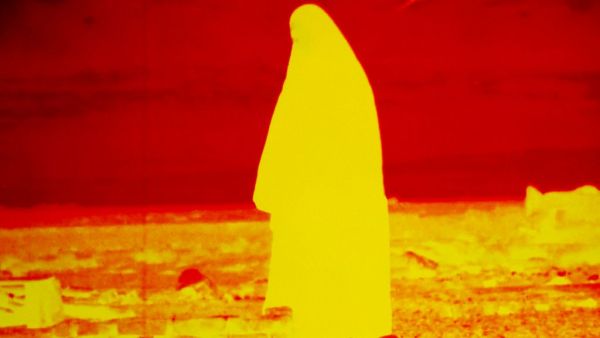
Razeh-del (Maryam Tafakory, 2024)
Sanne Jehoul, programmer & arts worker
United Kingdom
— Razeh-del (راز دل) by Maryam Tafakory (Iran, UK, Italy – 2024, 28’)
— The Flowers Stand Silently, Witnessing by Theo Panagopoulos (Scotland – 2024, 17’)
— And How Miserable is the Home of Evil by Saleh Kashefi (Switzerland, Iran – 2023, 7’)
Samir Karahoda, filmmaker
Kosovo
— City of Poets by Sara Rajaei (The Netherlands – 2024, 21’): A perfect example of how valuable family albums can be. It is a poetic short film that combines memory and reality using archival photographs, reflecting on cultural loss and the power of memories.
— Death of a Hero (En hjältes död) by Karin Franz Körlof (Sweden – 2024, 14’): Set in a small village, a cleverly made satire in true Swedish style, with dry humour about spectacle, entertainment, and heroism.
— Workers’ Wings by Ilir Hasanaj (Kosovo – 2024, 19’): An important film for our country, about the resilience and struggles of workers, reflecting on the human cost of labour and their lack of rights.
Oisín Kealy, Programme Manager Glasgow Short Film Festival
Scotland
— Quebrante by Janaina Wagner (Brazil – 2024, 23’): An incredible piece of work, it situates an affectionate individual and community portrait against the brutish history of nationalist expansionism, showcasing a oneiric audiovisual language that is all Wagner’s own. I was already mesmerised by this poetic journey along, below, and far above Brazil’s Trans-Amazonian highway, but the needle-drop on Falando Com a Lua for the credits sealed this for me as one of my top shorts of the year.
— Few Can See by Frank Sweeney (Ireland – 2023, 42’): Presenting oral histories with blacklisted Irish social movement leaders from the 1980s in the format of an era-appropriate current affairs talk show, this piece of fictional lost media felt almost like a gift from an alternate dimension. I loved most how it provokes one to imagine what kind of present Irish society might have emerged had these people been allowed on the airwaves at that time and, in turn, what other sinister futures are currently being manufactured through continuing political censorship today.
— The Flowers Stand Silently, Witnessing by Theo Panagopoulos (Scotland – 2024, 17’): This is an absolutely remarkable work of archival repurposing, and I’m so glad to see it getting its due. A poetic interrogation of two silent botanical films shot in Palestine by a Scottish missionary in the 1930s and 1940s, it asks crucial questions about the nature of audiovisual records and about what common colonial impulse links the creation of this footage to the most violent images we see coming from the same land today.
Nicolas Khabbaz, Programme and Artistic Director Beirut Shorts & Batroun Meditteranean Film Festival
Lebanon
— The Masterpiece by Alex Lora (Spain – 2023, 20’): This film presents perfectly, in a beautiful cinematic language, two opposite social classes with totally different backgrounds that share almost the same values. It’s this kind of film that stays with you. (Parasite was on my mind while watching this film)
— Fuck You I’m Millwall by Romain Dumont (France – 2023, 16’): It makes you feel that you are on a rollercoaster of emotions, a beautiful short story, stunning acting, imagery, and sounds. It’s this kind of film that captivates you.
— The Oasis I Deserve by Inès Sieulle (France – 2024, 22’): The arrival of artificial intelligence (AI) into our world raises a multitude of questions and challenges that touch on almost every aspect of human life from technology to ethics and social norms. The film navigates the complexities AI presents and the potential trouble it could generate. It’s this kind of film that scares you.
Sam Manacsa, filmmaker
Philippines
— Saigon Kiss by Hồng Anh Nguyễn (Vietnam, Australia, Germany – 2024, 22’): A delicate crossing of people. What is life if not for the tender, bittersweet in-betweens?
— Peaceland by Ekin Kee Charles (Malaysia – 2024, 12’): It was fun sitting with the grandmas and their perfect chemistry as they went on their way, just living life.
— Almost Forgotten (Quase Me Lembro) by Dimitri Mihajlovic & Miguel Lima (Portugal – 2023, 9’): Stunning animation that suits its exploration of individual and collective memory.
Jaime E. Manrique, Founder & Director BOGOSHORTS – Bogotá Short Film Festival
Colombia
— A Day in May (Un día de mayo) by Camilo Escobar Henao (Colombia – 2024, 15’): Loaded with an explosive childhood melancholy that makes us think about the first years of our lives and our loneliness, this short film reflects the solid growth of a director who will surely be a future reference point in Colombia and Latin-America. His delicate direction of actors and how he builds powerful sensations with minimal actions, make it a door to the heart.
— Skintone (Colorcarne) by Alberto Marchiori (Italy – 2023, 10’): Thanks to a simple approach to a complex subject, this short film manages to immerse us in the deep and complex discussion about racial segregation, but it also does it through the hand of a mother and a girl who are just trying to fit into the world without allowing the world to hurt them. That need to belong is not at the cost of everything; it has as a principle the need to transmit a message of respect and dignity to the new generations, and the short film reflects that search very well.
— Great Legacy by Dongeun Kim (South Korea – 2023, 17’): Through a comedy, this film proposes a light-filled journey through grief and the loss of loved ones. Maintaining the perfect balance between the absurdity of death and the sadness of having to say goodbye forever, the story manages to immerse us in a touching reflection on the value of life while allowing us to smile with respect.

The Oasis I Deserve (Inès Sieulle, 2024)
Emilia Mazik, selection committee member Film Fest Gent & Glasgow Short Film Festival, Head of Industry Kaboom Animation Festival
The Netherlands
— The Flowers Stand Silently, Witnessing by Theo Panagopoulos (Scotland – 2024, 17’): An archival footage of breathtaking, seemingly innocent floral landscapes is powerfully reused to expose the unseen oppression of the Palestinian people. No one is free until everyone is free.
— City of Poets by Sara Rajaei (The Netherlands – 2024, 21’): Urban transformations serve as a metaphor for darker social changes in this dreamy exploration of collective memory, nostalgia, and intergenerational storytelling.
— The Voice of the Sirens (La voix des sirènes) by Gianluigi Toccafondo (France, Italy – 2024, 20’): A reimagined tale of sirens, brought to life with mesmerising animation and a vibrant colour palette. Not to mention the quirkiness and the sweetness of the baby sirens.
Monika Navickaitė, Festival Co-director ShortScape Film Festival & Programme Assistant Vilnius Short Film Festival
United Kingdom
— The Medallion by Ruth Hunduma (UK – 2023, 19’): I first encountered this film about the Red Terror in Ethiopia at the Glasgow Short Film Festival earlier this year. It masterfully combines powerful imagery, striking artwork, and archival elements to evoke deep emotion, raise thought-provoking questions, and contrast joy and laughter with the horrors of authoritarian terror. The film’s themes resonate strongly in today’s context.
— Ei, Temi (Hey, Temi) by Marta Aguilella Antolí, Arnau Belloc Lorite & Jesús Minchón Rodicio (Spain – 2024, 10’): I firmly believe that fictional stories must retain some realism, while documentaries need an element of the extraordinary. This documentary feels like science fiction—a true crowd-pleaser, brimming with tenderness and authenticity.
— The Steak by Kiarash Dadgar Mohebi (Canada, Iran – 2023, 8’): This Slamdance AGBO Fellowship Winner 2024 is one of the most exquisite short films I’ve seen in my career. Its cinematic language is nothing short of ingenious: the film unfolds like a macabre yet mesmerising painting contained within a single frame. It offers one of the most poignant depictions of war and political unrest I’ve ever witnessed, skilfully playing with the viewer’s emotions—all without uttering a single word. My absolute favourite.
Isadora Neves Marques, filmmaker, visual artist & writer
Portugal
— Goodbye First Love by Shuli Huang (USA – 2024, 13’): A deceptively simple and low-budget film that captures you in its tenderness, precise framing, and cinematic sensibility. Two ex-lovers meet in a foreign land for one day only; the silences and suspenseful dialogue says it all. Saw it at the Film Fest Gent, where I was thrilled to see it be awarded the best short film prize.
— And How Miserable is the Home of Evil by Saleh Kashefi (Switzerland, Iran – 2023, 7’): Cinematic manipulation at its best, using found footage and sound to subvert the Iranian political regime. An efficient and triggering film, that keeps haunting you well after its ending.
— To Exist Under Permanent Suspicion by Valentin Noujaïm (France – 2024, 14’): Valentin Noujaïm continues his exploration of bodily liberation within the strict confines of La Défense, this time with a focus on the entrapment of a Black woman in corporate culture. Reminding me in both tone and attitude of early Paul Verhoeven films, Noujaïm yet again captures the tension between sensuality and historical repression, all the while avoiding a heavy hand.
Christoffer Ode, Programme Director Uppsala Short Film Festival
Sweden
— Memories of an Unborn Sun by Marcel Mrejen (Algeria, France, The Netherlands – 2024, 22’): Otherworldly beauty in delightfully unexpected combinations of forms and expressions that bring home some devastating truths about our history and here and now. Light as a form of memory, indeed.
— Hexham Heads by Chloë Delanghe & Mattijs Driesen (Belgium – 2024, 35’): Sensorically sublime and theoretically intriguing at once, and some wildly original takes on several genres on top. What’s not to love?
— Death of a Mountain by Nuno Escudeiro (Portugal, France – 2023, 37’): The short films that have impacted me most this year seem to oscillate between dream and reality, past and future, truth and fiction. Films that take their time to reveal the trauma within and that burrow down deep inside of me and never leave. None more so than this one.
Naomi Pacifique, filmmaker
The Netherlands
— What Mary Didn’t Know by Konstantina Kotzamani (France, Greece, Sweden – 2024, 54’): Will love always hurt? The ostrich cry rings shrill in the skin. This is a film that I loved for the questions it asks in the context of a young person trying to live her life: questions which don’t lose relevance with age, that I still hear ringing in my own life. I also loved the sex scene for how it managed to convey a felt inner journey through the simplicity of a central shot on Mary’s face.
— Freak by Claire Barnett (USA – 2024, 14’): I found this film beautiful for its truthful approach to intimacy. Sometimes, it’s just the wrong button in the body that gets pushed, and the past (or what is left of it) comes spilling out. The suave mix of a DV cam, a Jesus Christ fetish, and two humans spending time together in a room is also beautifully synthesised, leaving space for vulnerability, humour, and (mis)connection.
— Montsouris Park by Guil Sela (France – 2024, 14’): This film moved me because of its reverence for banality. Magic is happening around us all the time in tragic, funny, and marvelous ways. Shouldn’t we be more aware of it and attentive to it? I also appreciated its humility a lot—aren’t we so laughable, us little humans living our little lives? Told (nearly) all in one 16mm 400ft roll, and with a beautiful ode to a grandfather who used to collect coincidences.
Andreea Pătru, programmer
Spain
— Vox Humana by Don Josephus Raphael Eblahan (Philippines, USA, Singapore – 2024, 22’): An outstanding, immersive work that develops a spiritual realm governed by ancestral traditions and relations with nature. A refreshing perspective on Indigenous people rooted in the best Filipino cinema.
— Baldilocks (Kaalkapje) by Marthe Peters (Belgium – 2023, 25’): Daring work reflecting vulnerability, limits and self-discovery. A cathartic essay film crafted with autobiographical material, Baldilocks is one of the most courageous films I’ve seen this year, intelligently challenging filmmaking devices while moving us to the core.
— Coral (Wolna) by Sonia Oleniak (USA, Poland – 2023, 18’): I am bewitched by Iva Bittová’s singing in this dream-like, surreal film, where imaginary languages and the irrationality of dreams make sense.
Carlos Pereira, filmmaker
Germany
— Nuestra Sombra by Agustina Sánchez Gavier (Germany, Argentina – 2024, 20’): For reminding us that cinema is a place inhabited by spectres.
— The Exploding Girl (La Fille qui explose) by Caroline Poggi, Jonathan Vinel (France – 2024, 19’): For reminding us that cinema starts because something doesn’t feel right.
— Razeh-del (راز دل) by Maryam Tafakory (Iran, UK, Italy – 2024, 28’): For reminding us that history is written at night.
Michiel Philippaerts, programmer Film Fest Gent
Belgium
— Goodbye First Love by Shuli Huang (USA – 2024, 13’): Shot on a DVCAM during a visit to a childhood friend in gray, muted Frankfurt, Shuli Huang’s short film Goodbye First Love captures everything I love about cinema. It exudes urgency, radiates longing, and feels spontaneous, yet it’s driven by a precise mise-en-scène that reveals more about its world than the soft-spoken conversations between the two men (Huang and his friend) ever could. There’s profound beauty to be found in filmmakers documenting their (lost) loves without chasing grandeur. Huang himself calls it a “souvenir”—and at no point does it feel like he made the film for anyone beyond the two people on screen. We’re just grateful to bear witness.
— And How Miserable is the Home of Evil by Saleh Kashefi (Switzerland, Iran – 2023, 7’): Intelligently and movingly reappropriating official footage from Ali Khamenei, Iran’s supreme leader, an alternative future emerges from the rubble. Woman, Life, Freedom.
— Not Like Us by Kendrick Lamar & Dave Free (USA – 2024, 7’): The metaphorical nail in Drake’s coffin, following the ideological clash between two hip-hop titans. Fully aware of Kendrick’s hypocrisies—and, admittedly, my own—this music video for a messy track that preaches both love and war felt like an explosion of colour and joy. Seeing Kendrick shoulder to shoulder with Schoolboy Q, Ab-Soul, and Jay Rock was a powerful tribute to camaraderie and resilience, while scenes of him dancing with his fiancée and children at home added a tender, intimate layer. It felt like the inauguration of a new chapter in hip-hop iconography.
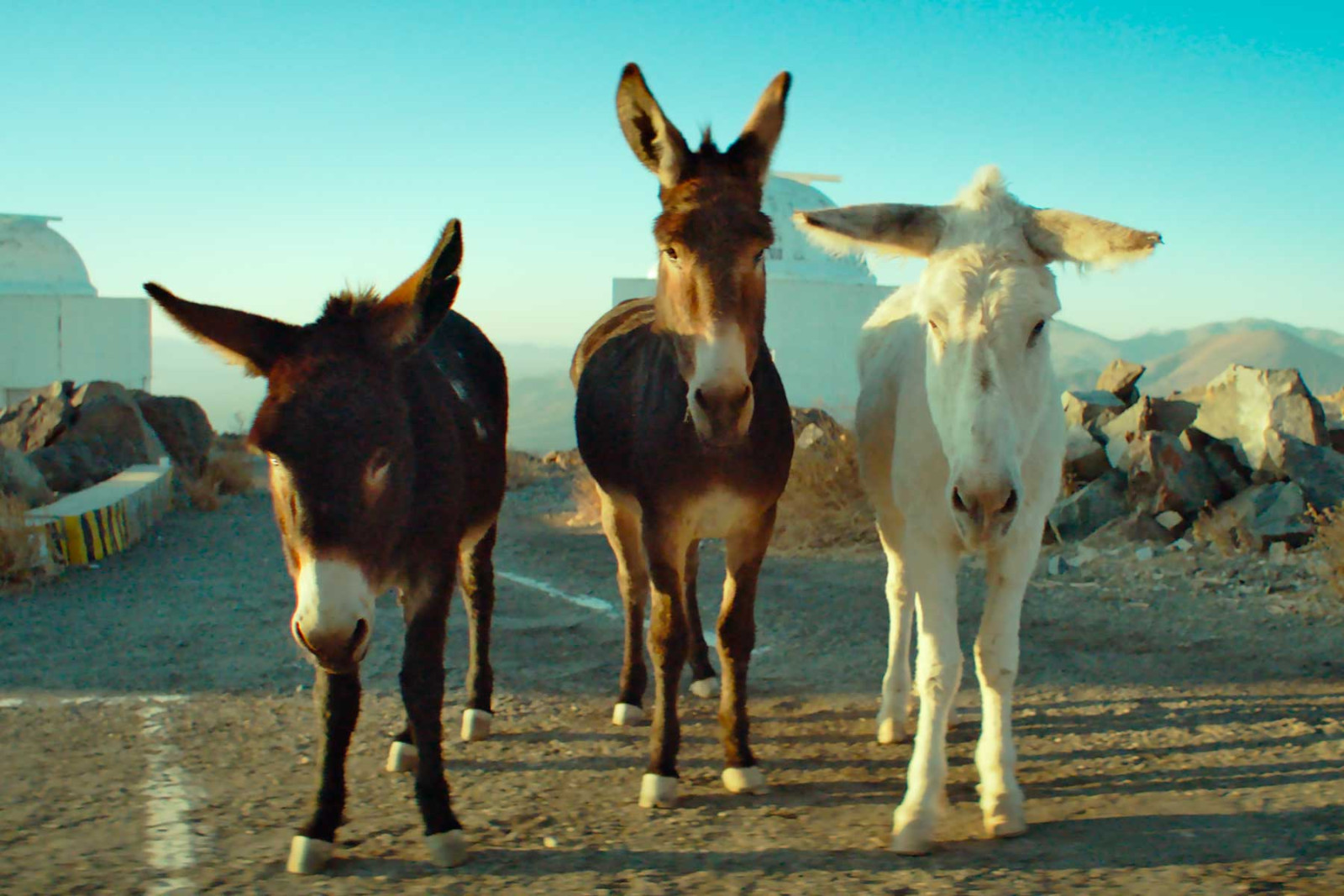
Perfectly a Strangeness (Alison McAlpine, 2024)
Émilie Poirier, Head of Short Film & Feature Film Programmer Montreal Festival du Nouveau Cinéma (FNC) & selection committee member Directors’ Fortnight (Cannes Film Festival)
Canada
— The Colloquy of Dogs (Le colloque des chiens) by Norman Nedellec (France – 2024, 22’): For its contemporary take and daring cinematic interpretation of Miguel de Cervantes’ novella The Dialogue of the Dogs, this film is reinventing non-human dialogue with philosophical and conceptual contemplations conveyed by existentialists dogs that were touched by the grace of speech. Laying between a non-fiction and fantasised approach to filmmaking, this delicate, secretive, and sensitive camera allows us to receive all the nuances of this melancholic discourse during this particular silent night.
— The Mirage of Ultra Realistic Hands (le mirage des mains ultra réalistes) by Guillaume Vallée (Canada – 2024, 14’): For its touching approach to experimental cinema and its renewed take on male friendship, this film explores masculinity without being too didactic, informative or moralising. This skillful and poetic approach to the cinematic motif of gestures shows us that we can still fully build narratives that come to life through the magical dance of hands and its affect. We think, connect, reveal ourselves, and love with our hands in this picturesque mirage that Vallée cleverly created for us.
— Perfectly a Strageness by Alison McAlpine (Canada – 2024, 15’): A poetic invitation to a dérive in which donkeys urge us to stop focusing on everyday life to fully immerse ourselves in this unplanned journey through the Atacama desert. This consciously meditative and astronomical wandering is mastered through meticulous photography and a commendable approach to sound. From the infinitely large to the infinitely small, this film is a testament to sensory cinema when it is mastered.
Oleksandra Prokopenko, programmer Kyiv International Short Film Festival
Ukraine
— I Died in Irpin (Я померла в Ірпені) by Anastasia Falileieva (Ukraine, Czech Republic, Slovakia – 2024, 11’): For its powerful and urgent portrayal of a deeply personal survival story set against the backdrop of Ukraine’s national tragedy.
— Where Russia Ends (Там, де закінчується Росія) by Oleksiy Radynski (Ukraine – 2024, 25’): For guiding us on an enthralling journey through the past, offering sharp and insightful commentary on contemporary issues such as Russian imperialism, the genocide of nations, and the erasure of identities and ecosystems.
— Perfectly a Strangeness by Alison McAlpine (Canada, Chile – 2024, 15’): For its masterful storytelling through visual, sonic, and sensory exploration, inviting us into an enigmatic and captivating narrative that pushes the boundaries of our expectations and imagination.
Leong Puiyee, programmer
Singapore
— WAShhh by Mickey Lai (Malaysia – 2024, 23’): An uneasy, vulnerable film that questions race and politics, mixed with superstitions. It left an impression after the end as I pondered the trauma of being forced into a situation you have no control over.
— My Wonderful Life (早安健康) by Calleen Koh (Singapore – 2024, 10’): I like how the film encapsulates the unappreciated labour of a mother in such a humorous, tragic yet realistic manner. I especially love how the film took a twisted comedic turn, revealing how desperation can lead to questionable actions. The film ends in a poignant, delicate stir as the mother returns to reality, which ties back to the unchanging circumstances of life sometimes.
— The One Who Knows by Eglė Davidavičė (Lithuania, France – 2024, 12’): A delicate film about girlhood that is both dreamy and hopeful. The film lovingly approaches the topic of acceptance of one’s body shape with care, which is a joy to watch.
Niels Putman, Artistic Director Kortfilm.be, Chief Editor Talking Shorts, (pre-)selection committee member at Film Fest Gent, FILMFEST DRESDEN, Fantoche Int’l Animation Film Festival, Avila & Busan Int’l Short Film Festival
Belgium
— Incident by Bill Morrison (USA – 2023, 30’): I saw this at Dokufest only a few days after footage of the horrifying murder of Sonya Masse went viral. Bill Morrison’s poignant bodycam exposé is both a testament to the power of montage and a vital plea to make all surveillance and police bodycam images public property for the sake of justice. Incident leaves you seething with fury, and rightfully so.
— Towards the Sun, Far From the Center (Al sol, lejos del centro) by Pascal Viveros & Luciana Merino (Chile – 2024, 17’): Blurring uniformity with anonymity, queer romance with cityscape, this film’s shift from macro to micro feels both revealing and reassuring as it finds poetry locked under the simmering vastness of a metropole. Ah, minimalism!
— And How Miserable is the Home of Evil by Saleh Kashefi (Switzerland, Iran – 2023, 7’): This will forever remain a go-to work for me to express the strength of short film and the political capacity of low-budget filmmaking—Kashefi’s use of archive and sound is bold and incredibly effective. If only every film could be this radical.
Carlos Ramos, Festival Co-Director & Programmer IndieLisboa – International Film Festival
Portugal
— Sinking Feeling by Zachary Epcar (USA – 2024, 21’): Confirmation of Zachary Epcar’s seductive, mesmerizing, and ravishing universe. An evocation of the lethargy of post-modernism.
— Tako Tsubo by Eva Pedroza & Fanny Sorgo (Austria, Germany – 2024, 6’): Love is a disease until you find your next one in a pool of blood.
— The Hunters (Os Caçadores) by David Pinheiro Vicente (Portugal – 2024, 29’): A refreshing farce in full technical and formal mastery.
Jay Rosenblatt, filmmaker
USA
— Autism Plays Itself by Janet Harbord (UK – 2023, 20’): It is rare that a film can completely change your thinking/worldview about a subject. Using a 1957 black-and-white educational film about autism, this new film brilliantly reframes the behaviours of the participants and, in the process, expands our notions of neurodiversity.
— The Veiled City by Natalie Cubides-Brady (UK – 2023, 13’): Using an old black-and-white film of London’s Great Smog of 1952, this creative, hybrid poetic short has dire implications for our current climate crisis.
— Incident by Bill Morrison (USA – 2023, 30’): Using street surveillance footage, this disturbing and provocative film shows an innocent Black man killed by the police and their attempt to cover it up. An editing virtuoso that leaves you devastated.
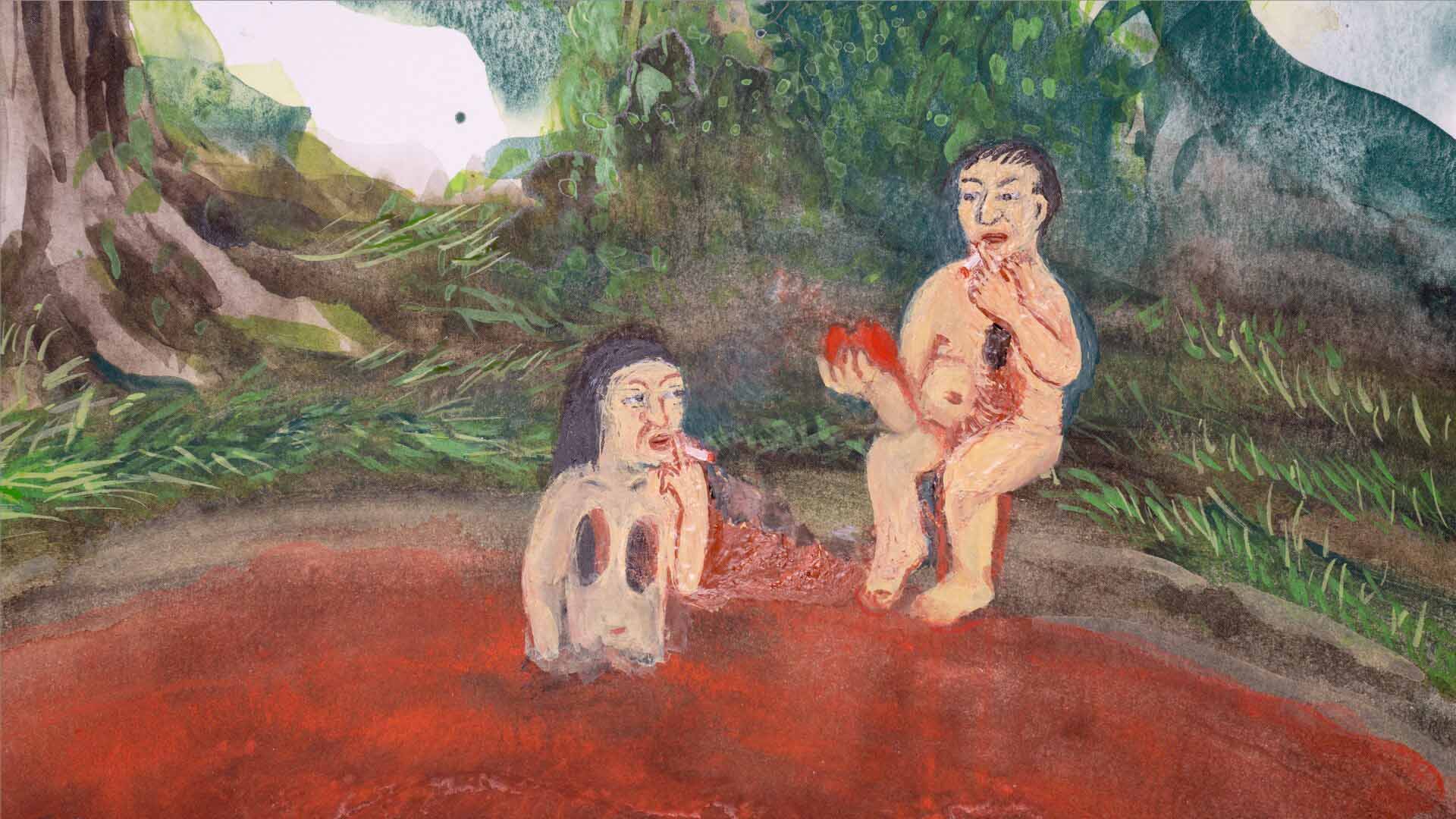
Tako Tsubo (Eva Pedroza & Fanny Sorgo, 2024)
Julie Rousson, programmer Clermont-Ferrand Interational Short Film Festival
France
— Milk by Miranda Stern (UK – 2024, 25’): After her previous film Clean, Milk feels like a postcard from an old friend catching you up on their life. We find the raw and deeply personal tone and imagery of Miranda Stern once again as she dives into her personal story, managing to touch everyone right in the heart.
— Hurikán by Jan Saska (Czech Republic, Bosnia and Herzegovina, Slovakia, France – 2024, 13’): Drawing inspiration straight from graphic novels, Hurikán takes us on a frenetic quest filled with colourful characters, blending elements of film noir and buddy movies.
— Upshot by Maha Haj (Palestine, France, Italy – 2024, 34’): A film that demonstrates how a story needs to take the time required to unfold its plot and find its meaning. A slow and intimate portrait of pain—the pain of the past that we try to forget but ultimately catches up to haunt the present.
Céline Roustan, programmer, Short of the Week, Palm Springs ShortFest, Leeds International Film Festival & selection committee member Festival de Cannes
France
— Amarela by André Hayato Saito (Brazil – 2024, 15’): Amarela made me cry, and I don’t say this often! This slice-of-life narrative, set in Brazil on the fateful day that was the 98 World Cup final, turns into this profound character study that deeply touched me and, yes, brought me to tears. While on the surface, it is yet another coming-of-age story, it is incredibly nuanced and undeniably effective.
— An Orange from Jaffa by Mohammed Almughanni (Palestine, Poland, France – 2024, 27’): Al Mughanni subverts expectations with the conflict he builds his narrative around. It subtly yet poignantly exposes one of the most insidious tactics of the Israeli occupation: creating divisions between the occupied Palestinian populations. The performances remarkably carry the weight of the nuances of the screenplay, enhancing the anxiety inducing tension of the situation.
— Who Loves The Sun by Arshia Shakiba (Canada – 2024, 19’): I, unfortunately, saw Who Loves The Sun on my laptop, like most films, and my first reaction when it ended was that I wish I had seen it in a theatre. The images simply take your breath away. The score and the editing are incredibly well crafted. They all come together perfectly to make this film impressively captivating while conveying with sensitivity the harsh reality of the participants.
Anas Sareen, filmmaker
France
— A Bird Flew (Un pájaro voló) by Leinad Pájaro De la Hoz (Cuba – 2024, 20’): An eloquent tale about the grief of men. (It opens with birdsong; I have a thing for birds in films…)
— Aunque es de noche (Even Though It’s Night) by Guillermo García López (France, Spain – 2023, 15’): A bold and emotionally raw take on the meaning of childhood friendship. (Plenty of birds! Loved it!)
— The Oasis I Deserve by Inès Sieulle (France – 2024, 22’): A trip down the darker corridors of our selves, and our desperate need for love. (No birds).
Ren Scateni, film curator and writer
United Kingdom
— Razeh-del (راز دل) by Maryam Tafakory (Iran, UK, Italy – 2024, 28’): I need films to act as an antidote to dullness and moral inertia. I need them to remind us of our individual and collective power to initiate revolution. Razeh-del is one of those films.
— Few Can See by Frank Sweeney (Ireland – 2023, 42’): A complex and layered film preoccupied with reenacting materials lost to censorship and recreating alternative histories of resistance embedded in media that have the guts to be revolutionary instead of hiding behind dominant narratives. It’s a film that speaks to the very contemporary censoring of dissenting voices while also asking subtle questions about the gaze, cameras, and our tacit consent to relinquish control over our own image.
— The Flowers Stand Silently, Witnessing by Theo Panagopoulos (Scotland – 2024, 17’): Archival research as embalming practice, a radical act of resistance suffused with anger, gentleness, nostalgia, and ardour. Let films be a conduit for liberation. Let them free you from the shackles of privilege and passivity. Let them invite you to chant “Free Palestine!” until we will ultimately manifest that reality together.
Sven Schwarz, Managing Director Kurzfilm Festival Hamburg & member of A Wall is a Screen
Germany
— Dreams Like Paper Boats (Des rêves en bateaux papiers) by Samuel Suffren (Haiti – 2024, 19’): Deeply touching from a different perspective than the usual films about this subject. This film pulled me with amazing strength into the screen.
— Tako Tsubo by Eva Pedroza & Fanny Sorgo (Austria, Germany – 2024, 6’): Weird, funny and …ahem.. heart-warming at the same time!
— Late Summer 91 (Spätsommer 91) by Olaf Held (Germany – 2024, 14’): Every year there needs to be this little weird—and in this case, very German—gem in the year-end polls. I have no clue if this film works at all in a non-German speaking context but it just shows that with little means and a great funny idea the short form can just pull something out of its hat that makes and made quite a few people smile.
Maya Sfakianaki, programmer
United Kingdom
— Clamor (Bucan) by Salomé Da Souza (France – 2023, 25’): Because it made me whip, it turned me on, it moved me, and it gripped me. All these despite the fact I don’t have a cousin.
— The Sunset Special 2 by Nicolas Gebbe (Germany – 2024, 19’): A psychedelic and visually nostalgic journey encompassing stunning graphics and animation, with fragments of early 2000s video games, AI-generated footage, and a unique visual aesthetic that embodies the complexity and abundance of the capitalist world it critiques.
— for here am I sitting in a tin can far above the world by Gala Hérnandez (France – 2024, 19’): This experimental documentary manages to be both eerie and emotional, both uncanny and deeply humane, both deep and digestible. It’s an experimental doc crowd-pleaser, commenting on consumerism, humanity’s disturbing obsession with the future and survival, while insisting on the charming nature of the present.
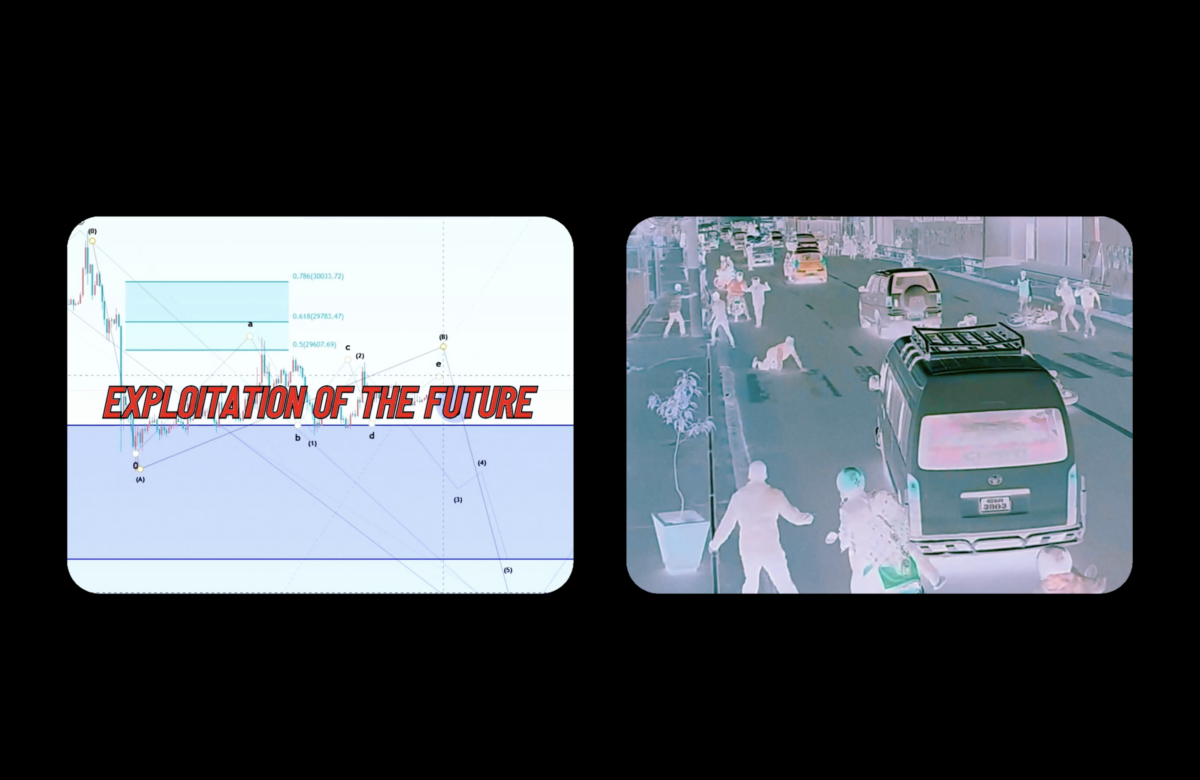
for here am I sitting in a tin can far above the world (Gala Hérnandez, 2024)
Ines Sieulle, filmmaker
France
— Pacific Vein by Ulu Braun (Germany – 2024, 12’): I was lucky enough to see Pacific Vein four times this year. Each viewing was a deeper discovery. At first, a comic fresco of the United States, Pacific Vein then becomes an unexpected dystopian tale, ending with a reflection on images and time. Our way of looking at the world and trying to transcribe what it has to offer, with all its inconsistencies, yet representing reality so well.
— What Mary Didn’t Know by Konstantina Kotzamani (France, Greece, Sweden – 2024, 54’): What Mary Didn’t Know is constructed as a fable of adolescence, inspired by the romantic tales of vacations and teenage romance that have lulled us from our earliest childhood. But what Konstantina Kotzamani succeeds in doing is appropriating the codes of the teen movie to make us relive those moments while laughing at our own experiences. Mary navigates her tumultuous emotions, and we follow her, accepting that each of our memories is an island, a temple of incomprehension, yet one that will form the archipelago of our humanity.
— City of Poets by Sara Rajaei (The Netherlands – 2024, 21’): City of Poets is a film that begins with the simple fact of a city that has named its streets after poets. Thanks to a precise mastery of sound, image editing, and Sara Rajaei’s haunting voice, the film invites us to a meticulous exploration of detail. Like poetry discreetly embroidered into everyday life, City of Poets invites us to an empirical contemplation where every element seems to whisper a forgotten story, right down to the flowery blouses worn by the women, where the melancholy of a bygone era can be discerned.
Jason Sondhi, co-founder Short of the Week & Shortverse
USA
— Instruments of a Beating Heart by Ema Ryan Yamazaki (Japan – 2024, 23’): My favorite sports film of the year. That’s tongue-in-cheek, but the narrative arc is such a feel-good classic underdog story. Most short docs don’t even have an arc to speak of, but Ayame’s quest to bang a cymbal in time was my favorite hero’s journey of 2024.
— God is Good by C Prinz & Jeremy Pope (USA – 2024, 21’): The most invigorating film-going experience I had in 2024 was a private screening of this short. I still don’t fully know how I feel about the film itself, but it was such a treat to witness commercial talents like Pope and Prinz self-interrogate so relentlessly and self-consciously pursue ART with such audacity. The Q&A was painfully intimate and stretched over an hour with love, support, and thoughtful discussion from the room: a magical night and a reminder of why we champion cinema.
— End Zone by Guy Kozak (USA – 2023, 9’): Such a big smile from the first second. An aesthetic delight—myth, Americana, and kitsch have a baby, and this film is the result.
Philip Tompson, filmmaker
USA
— Tuesday Film by Kaylinn Duffy (USA – 2024, 13’): Unbridled creativity bursts at the seams in this film, constantly offering something new to think about or look at every thirty seconds. Whether it’s a personal narrative or a complete narrative construction, Tuesday Film signals the emergence of a very exciting new voice in the landscape.
— Baldilocks (Kaalkapje) by Marthe Peters (Belgium – 2023, 25’): Radically honest, Peters has a special gift for emotional directness, making this film a true exercise in personal expression. It delves into how the filmmaker feels about her upbringing and her life now, avoiding cheap sentimentality to remain a genuine personal confession.
— Dad Swap by Ethan Mermelstein (USA – 2024, 18’): Hilariously cathartic and painful, this father-son story dances on the line between exploitation and collaboration in an unexpectedly fun way. Ultimately, the film shows how the medium and the act of performance become the only way these two can be emotionally truthful to one another, becoming one of the funniest and most revealing 20-minute therapy sessions I’ve seen in quite a long time.
Sonya Vseliubska, film critic
United Kingdom
— Where Russia Ends (Там, де закінчується Росія) by Oleksiy Radynski (Ukraine – 2024, 25’): A benchmark example of an inexhaustible resource for contemporary Ukrainian cinema—tons of unknown archives and decolonial optics. Radynski managed to make a profound, almost academic analysis of Russian imperialism in its active continuum, which echoes from the Siberian mountains to the centre of Europe.
— I Died in Irpin (Я померла в Ірпені) by Anastasia Falileieva (Ukraine, Czech Republic, Slovakia – 2024, 11’): Allow me to quote Anastasia: “At home, it’s a film about abuse against the backdrop of war, while abroad it’s a film about war against the backdrop of abuse”. It is an absolutely horrifying testament to the intersection of two traumas with one of the most talented combinations of animation and documentary footage ever seen.
— Perfectly a Strangeness by Alison McAlpine (Canada, Chile – 2024, 15’): Perhaps the most humanistic and poetic film I have seen this year. What is astonishing is how, while remaining so faithful to its unbelievable story, it manages to question the genuine nature of documentary and its ability to construct an additional reality.
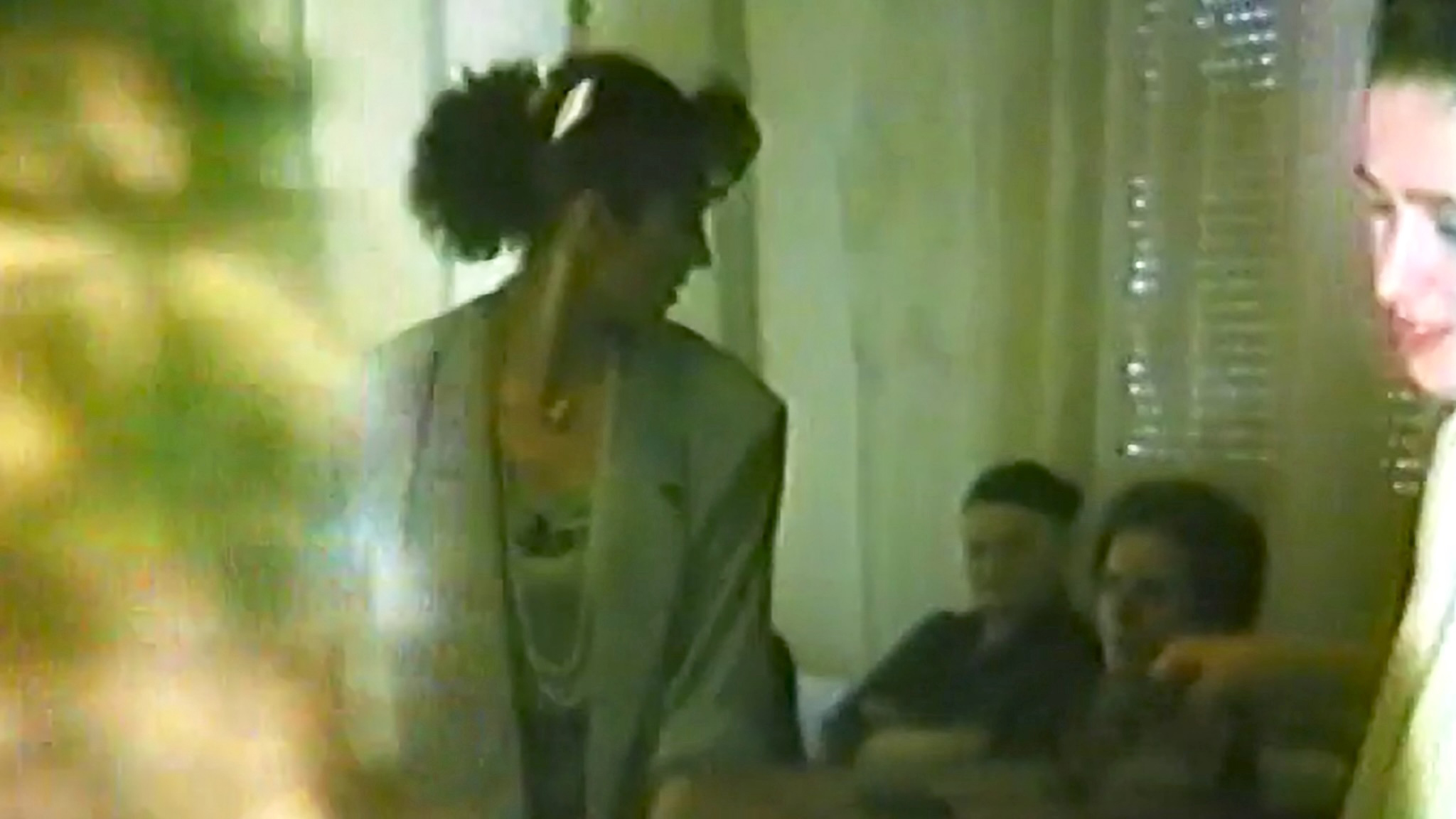
Like a Sick Yellow (Norika Sefa, 2024)
Carla Vulpiani, short film advisor La Biennale di Venezia
Italy, Ireland
— Who Loves The Sun by Arshia Shakiba (Canada – 2024, 19’): Who Loves The Sun speaks volumes about doing what cinema is supposed to, to create meaning and narrative purpose within the power of images. It is a silent, everyday journey to a land deprived of years of wars, inhabited by a population left to cope, make leverage and a living with what’s left, in a constant unbalance that seems to leave space only for surviving. Arshia Shakiba’s powerful pictures perfectly frame the huge, en-plain-air, universal, social injustice of our times.
— O by Rúnar Rúnarsson (Iceland, Sweden – 2024, 29’): O is a wonderful and tender piece that speaks with the deepest levels of human pain. Ingvar Sigurðsson delivers a stunning performance as Grímur, an alcoholic father who challenges his addiction on his daughter’s special day. The masterly narration implant built by Rúnar Rúnarsson allows the tracing of a whole and complex tragedy of a man, making it profoundly relatable. Tears shall be welcome to flow.
— Gender Reveal by Mo Matton (Canada – 2024, 13’): Like a bright star in the sky, Mo Matton established themselves in the filmmaking world with a sparkly debut comedy. Mixing contemporary ingredients, Gender Reveal is the ultimate satire on the ridiculousness of gender obsession that the heteronormative world refuses to acknowledge about itself. The film roots its inspirations into contemporary cinema, fulfilling, at best, its ambitions of delivering a triumphal, paradoxical, gorgeous, colourfully surreal, and ultimately just hilarious narrative.
Neil Young, writes about, presents, curates, makes, and acts in films
Austria
— Workers’ Wings by Ilir Hasanaj (Kosovo – 2024, 19’): “We could manage to survive without money changers and stockbrokers. We should find it harder to do without miners, steel workers and those who cultivate the land.” — Aneurin Bevan
— Scénarios by Jean-Luc Godard (France, Japan – 2024, 18’): “I’m better than them, and I think I’m the best. But I’ll appear at midnight when the films close.” — Mark E Smith
— Joost Klein: “Luchtballon” (1999) by Lowpolyon (The Netherlands – 2024, 2’): “Ben zo hoog in de atmosfeer. Het liefst kom ik nooit, nooit, nooit meer neer. Het verleden doet zeer, maar heb ervan geleerd. En dat zeg ik terwijl ik de toekomst negeer. Door de wolken, langs de steden, ik kom nooit meer naar beneden. De toekomst is onzeker, wil gewoon m’n leven leven. Geef me even, geef me effe. Ik ben op eenzame hoogte en dat moet je wel beseffen.” — Joost Klein
Claudio Zilleruelo Acra, programmer, director, producer & Artistic Director Transmutacion Cine
Mexico
— Hawk Boy Sleeps Amidst Visions of a Fire (Niño halcón duerme entre visiones de un incendio) by Mauricio Sáenz-Cánovas (Mexico – 2024, 18’): This short film masterfully fuses traditional Mexican symbolism with the brutal reality of drug trafficking. The protagonist’s transformation into a hawk perverts national symbols: the eagle from the coat of arms becomes a servile predator, while ancestral naturalism turns into destructive metamorphosis. Fire, traditionally purifying, devours community values while the cartel distorts traditional family structures. A work that portrays the loss of cultural identity through devastating dreamlike language.
— Grandmamauntsistercat by Zuza Banasińska (The Netherlands, Poland – 2024, 23’): In this provocative experimental work, educational archival material from communist Poland is recontextualised to explore female identity formation. The narrative, seen through a child’s eyes, ingeniously interweaves Slavic folklore with social criticism, transforming initially propagandistic images into a reflection on matriarchy and resistance to the patriarchal system. This visual deconstruction challenges established gender roles while reimagining the archive as a space for female liberation.
— The Man Who Could Not Remain Silent (Čovjek koji nije mogao šutjeti) by Nebojša Slijepčević (Croatia, France, Bulgaria, Slovenia – 2024, 13’): The Man Who Could Not Remain Silent portrays a harrowing historical event during the Bosnian War: the 1993 train hijacking. This short film highlights the extraordinary moral courage of a single individual among 500 passengers who dared to confront paramilitary forces during systematic persecution and mass violence. His solitary act of resistance underscores the power of individual courage in the face of collective injustice.
Mentioned Films
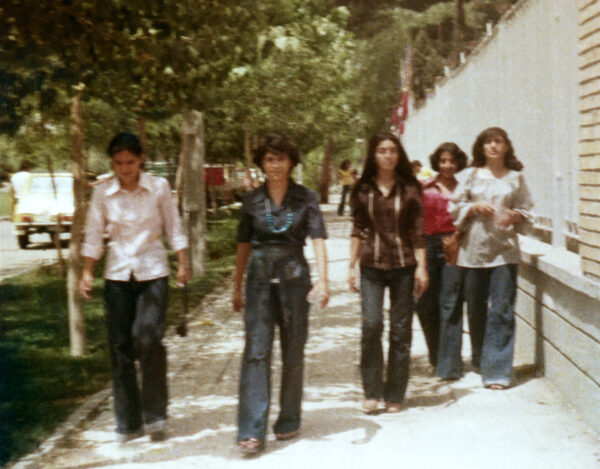
City of Poets
by
Sara Rajaei,
The Netherlands,
2024,
21’
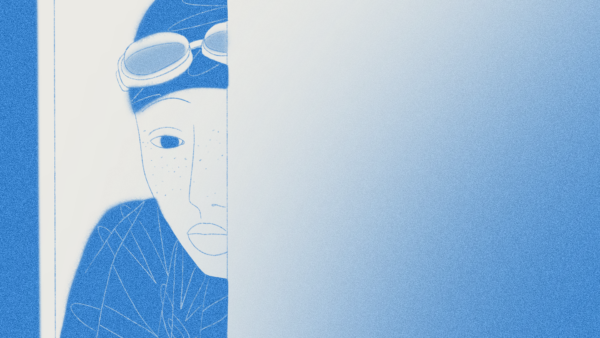
The One Who Knows
by
Eglė Davidavičė,
Lithuania,
France,
2024,
12’

Man Number 4
by
Miranda Pennell,
United Kingdom,
2024,
10’
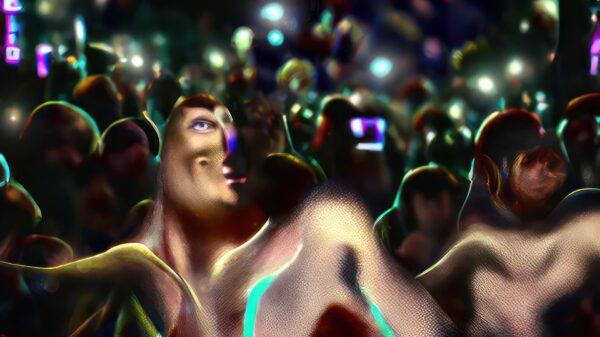
The Oasis I Deserve
by
Inès Sieulle,
France,
2024,
22’
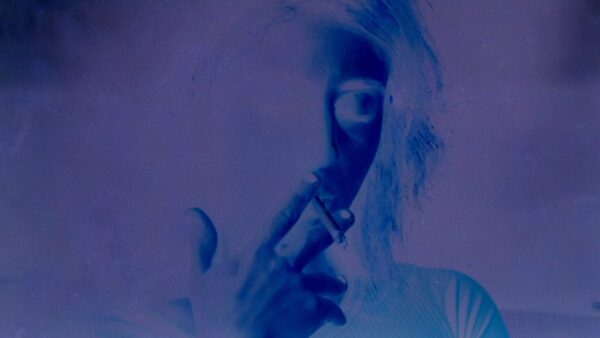
Mast-del
by
Maryam Tafakory,
Iran,
United Kingdom,
2023,
17’
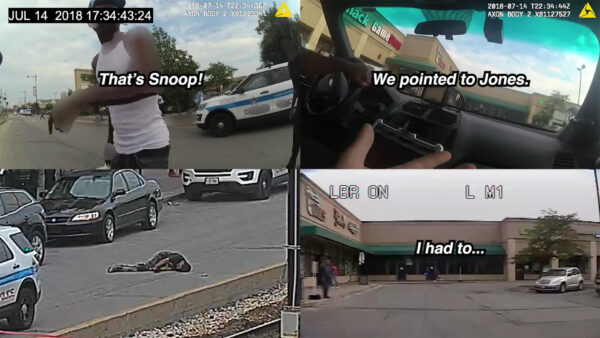
Incident
by
Bill Morrison,
USA,
2023,
30’
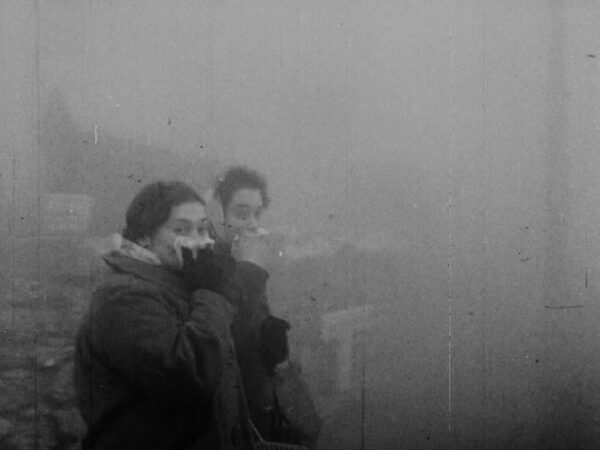
The Veiled City
by
Natalie Cubides-Brady,
United Kingdom,
2023,
13’
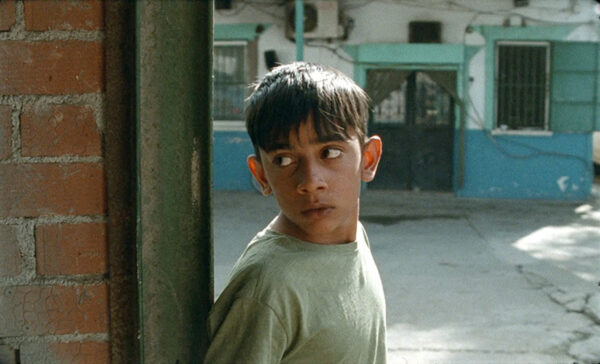
Aunque es de noche
by
Guillermo García López,
France,
Spain,
2023,
16’

